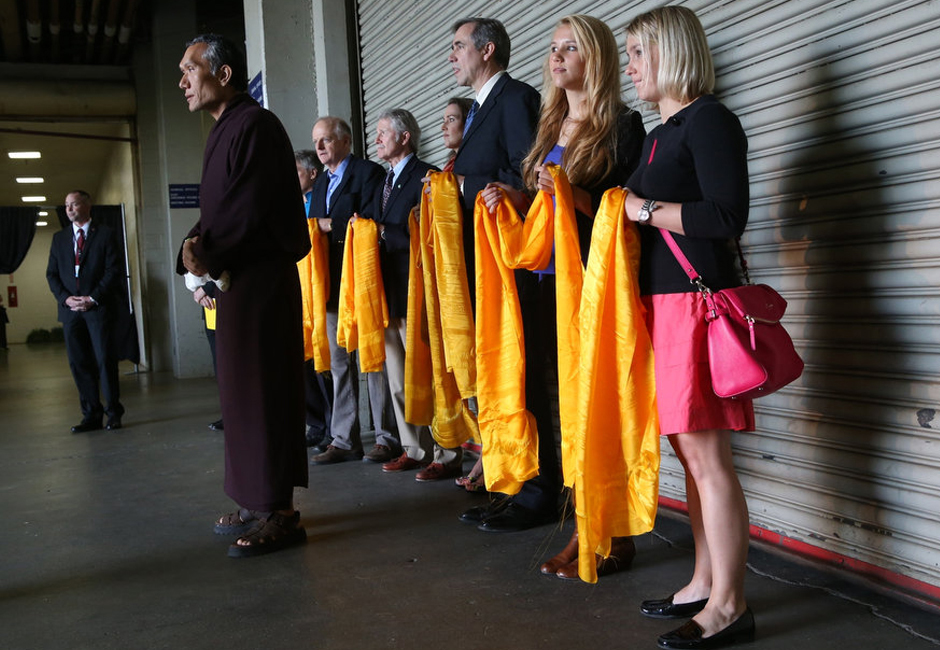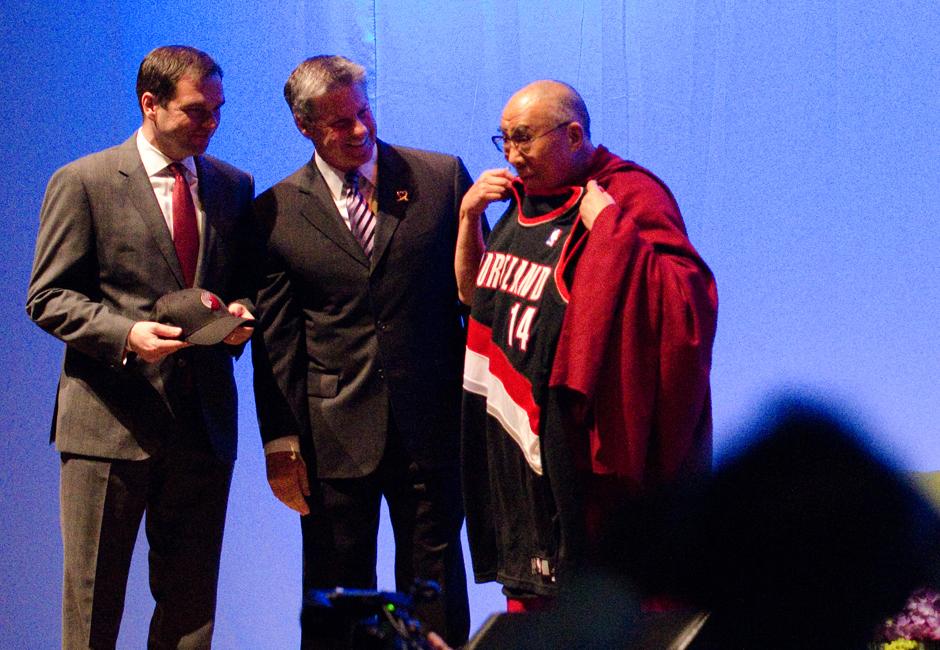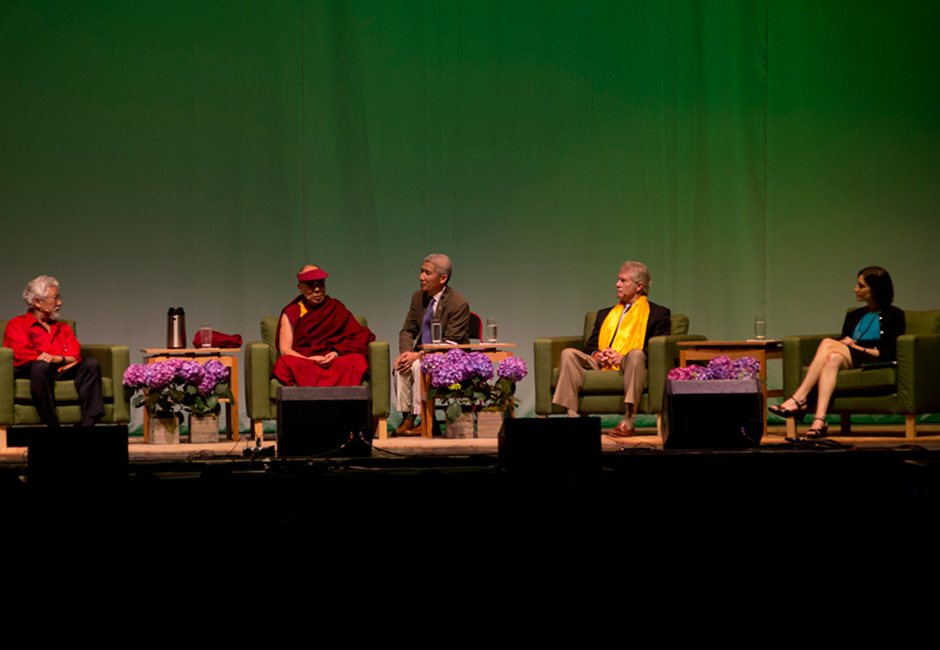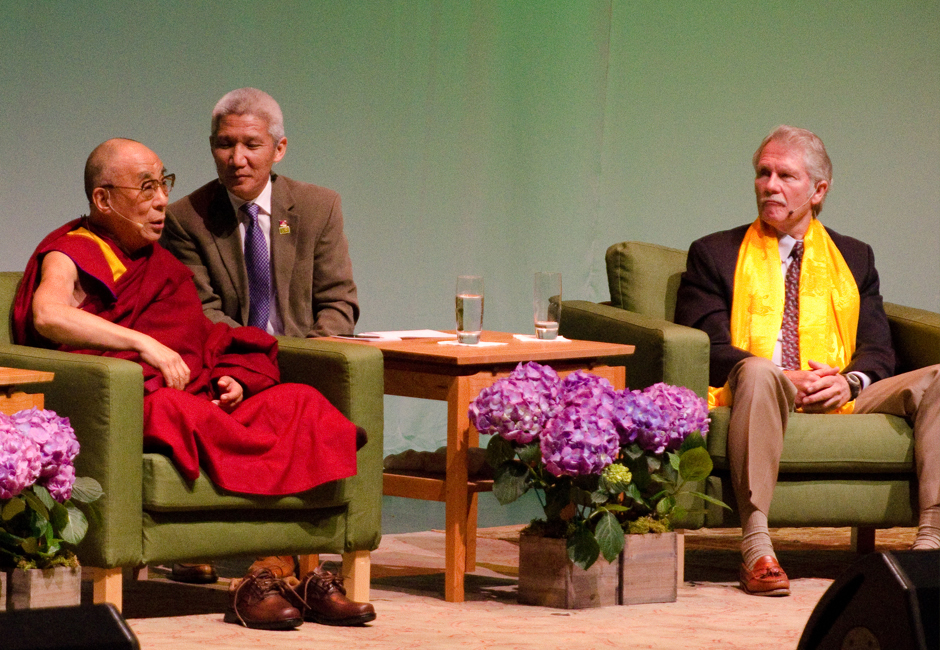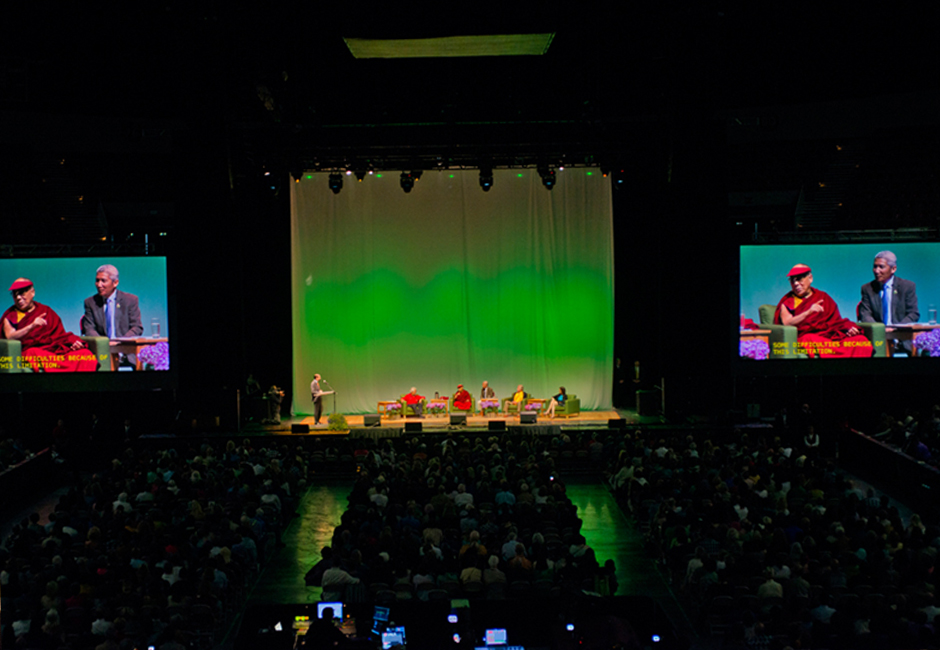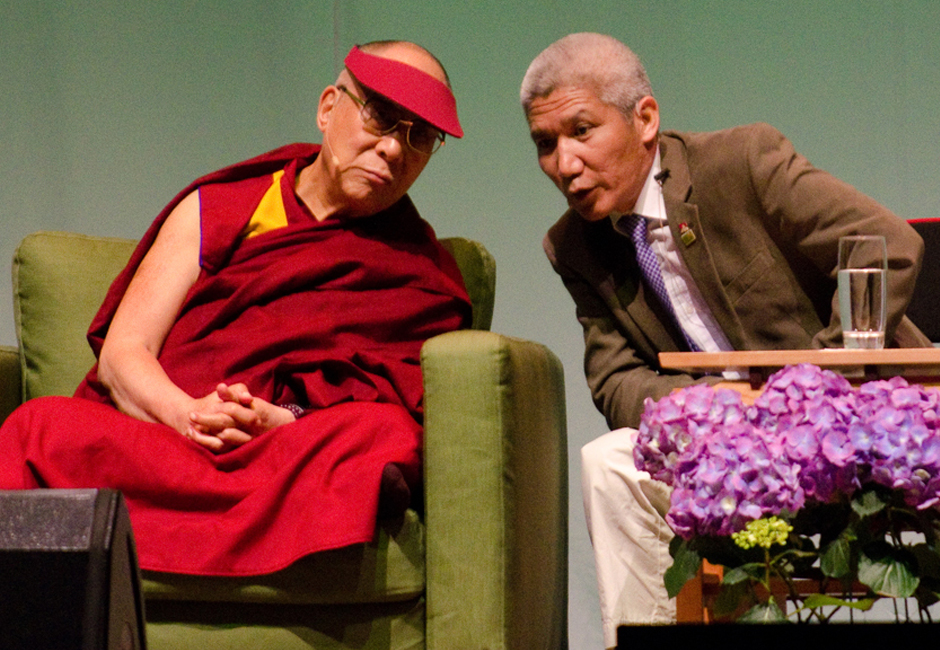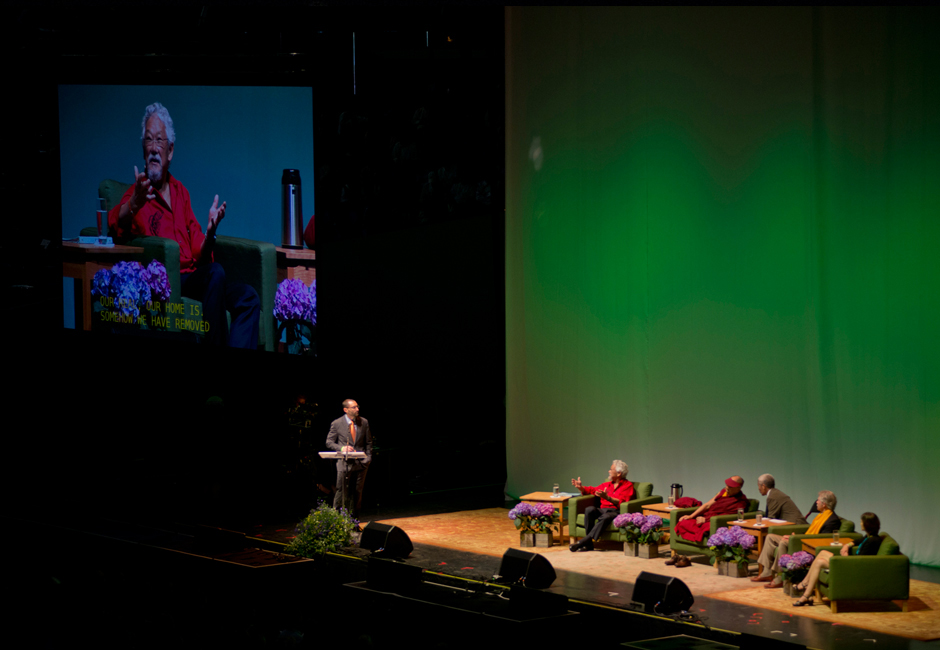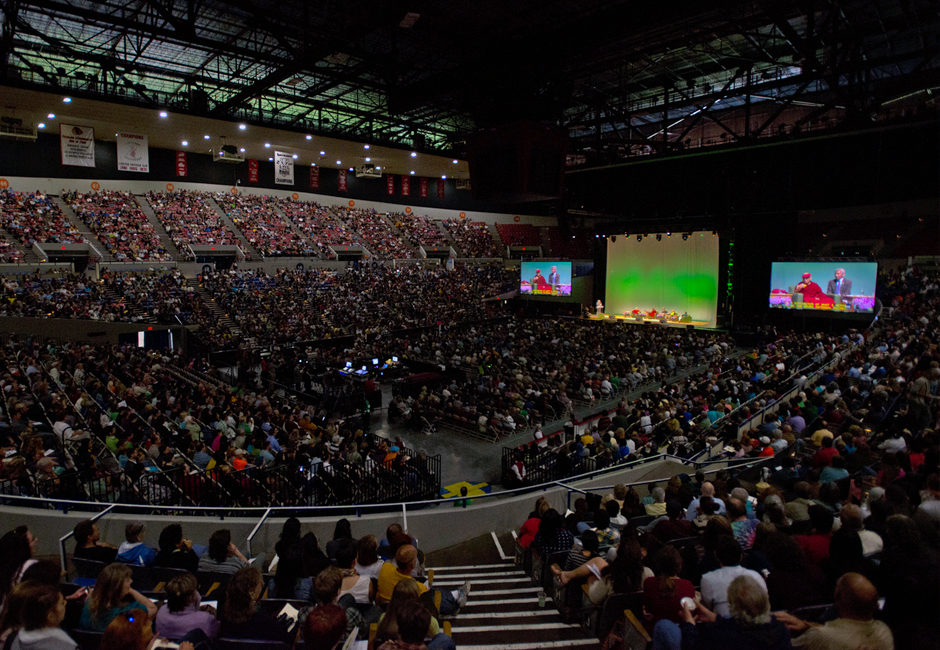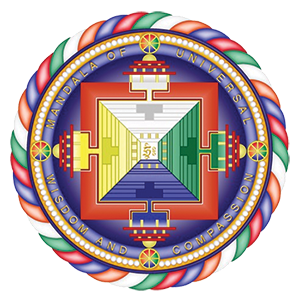How do we move from facts and inspiration to change through direct action? What ethical and scientific foundations, awareness, and support from their constituencies do public policy makers and activists need in order to advocate for and implement change? What kinds of actions have the potential to increase environmental conservation, environmental justice, and protection of the diversity of life on the planet? These questions were explored on the final day of the Environmental Summit by a panel discussion called Universal Responsibility & the Global Environment.
The third and final day of the 3-day summit was held in front of a capacity audience of over 10,000 in Portland’s Veterans Memorial Coliseum. His Holiness the Dalai Lama was among a panel of political and environmental leaders, including the renowned Dr. David Suzuki, discussing the roles of science, media, and policy-makers in catalyzing environmental action globally and in the Northwest. This event was moderated by David Miller of “Think Out Loud” on Oregon Public Broadcasting, with welcomes and introductions by U.S. Senator Jeff Merkley, Andrea Durbin, Executive Director of the Oregon Environmental Council, Oregon Governor John Kitzhaber, and award-winning film Director Darren Aronofsky.
View video of the Environmental Summit Panel
View photos of the Environmental Summit panel discussion
A Report on the Environmental Summit Panel
(source: the Office of His Holiness the Dalai Lama)
On the morning of the final day of the historic visit, following a press conference, His Holiness joined Oregon Governor John Kitzhaber; Andrea Durbin, executive director of the Oregon Environmental Council; and scientist David Suzuki, who hosts the Canadian television series, ‘The Nature of Things,’ in an environmental summit on the theme ‘Universal Responsibility and the Global Environment.’
Discussions were moderated by David Miller, host of Oregon Public Broadcasting’s ‘Think Out Loud.’ His Holiness was introduced before an audience of more than 10,000 by Senator Jeff Merkley. His Holiness had a number of points to make about the urgency of the environmental situation to begin with:
“In 1959 I was able to escape from Tibet to India because of the problems we faced there, but if our world experiences problems there is nowhere else for us to go. As a Buddhist monk I don’t have any children to worry about, but I’m sure the Governor and other panelists do. We have to be concerned about the future of those children and grandchildren. Allowing the gap between rich and poor to grow is not only morally wrong, but also practically a mistake. It’s not that we need to make the rich poorer, but we must find ways to improve the lot of the poor.”
David Suzuki remarked: “We have already passed so many tipping points, but it doesn’t seem to me there is any point in just saying ‘It’s too late’.”
Andrea Durbin agreed that on the global scale climate change is the big issue and we have not done nearly enough to address it, but on a local level there are other issues such as babies being born pre-polluted. There are 43 unregulated chemicals presently being passed on to babies while still in the womb. Governor John Kitzhaber added that we live in an economy based on consumption and we need a new measure of how it functions.
“It is our lifestyle that is important,” His Holiness responded, “but freedom is also important. The gap between rich and poor means that the poor are not free. We need to find ways to voluntarily restrain our greed and consumption and to encourage others to do so too. In pursuing our self-interest we need to be realistic; this is why education is so important. We need to develop a more contented way of life.”
Governor Kitzhaber pointed out that it is not just what we consume but our rate of consumption that needs to be addressed, while Andrea Durbin said that the old bumper sticker idea ‘Think globally, but act locally’ is still very relevant.
Asked what can be learned from the Buddhist view of the environment, His Holiness pointed out that during the lives of the founders of the great religions there were no environmental problems. However, he felt that it’s instructive that the Buddha was not born in a palace but under a tree. He attained enlightenment not in a cave, but seated under a tree and he passed away not in a monastery, but lying down beneath a tree. In the code of monastic discipline monks are encouraged not only to plant trees, but also to take care of them and in the context of their itinerant way of life, monks who come after are bound to care for the trees planted by those who went before. The unique Buddhist philosophical concept of interdependence can be seen at work everywhere in the natural environment and is relevant to every field of activity. From this we can see, His Holiness suggested, that human happiness depends on taking others into account.
There was a consensus about the need for a new vision with regard to the environment in a new spirit of co-operation. David Suzuki said we need a paradigm shift about our place on the planet. It’s un-American he declared to say: “We can’t.” The Governor averred, suggesting that in changing our economic model we have to be clear about what we want. He pointed out that when President Kennedy launched the US space program, he didn’t lay out a road map so much as he clearly indicated the destination.
His Holiness concluded with an explanation of three levels of understanding.
“First we listen or read and gather information; next we think about what we’ve learned and analyse it from different angles. Finally, we make ourselves thoroughly familiar with what we’ve understood. This is the way to reach a firm conviction on the basis of which we can change our way of life.”

